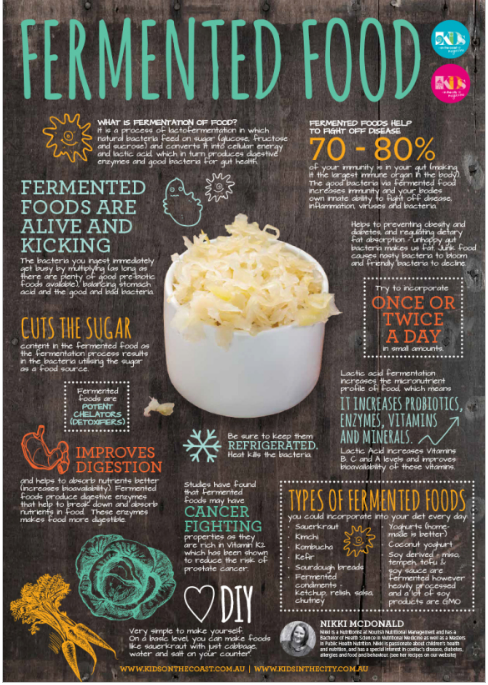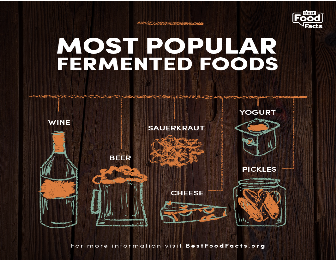- Jan. 17, 2019
- Akshitha
- Microbiome, Nutrition, Diet and Supplements
Fermented Foods & Microbiome
Since early history fermented foods have been consumed and have been an integral part of our diet. Fermented food gives surprising health benefits, including but not limited to, improved digestion, bioavailability of nutrients and prevention of diseases or its symptoms. For example, consumption of kimchi and other fermented vegetables have been correlated with reduced risk of asthma and atopic dermatitis; consumption of fermented soybean have shown to reduce the risk of type 2 diabetes and high blood pressure.
So, are fermented foods that beneficial?
Well, let’s figure out!!
Suppose you walk in to a super mart, you can find a few hundred varieties of fermented foods and products, indicating widespread consumption of such fermented foods. However, when it comes to knowledge about fermented foods, people are largely unaware of its utility and benefits. Consider these two surveys for example;
A survey was conducted with 335 people consuming yogurt and other cultured dairy products and indicated that their main source of fermented food, and even probiotic, was yogurt. So, there is good evidence that large number of people are consuming such fermented foods. However, a similar survey conducted with 233 people revealed that they were consuming yogurt and other dairy products but were unaware of "fermented dairy products" as a category, and they were unsure that if the dairy products were fermented.
So first let’s understand, what is fermentation and what fermented foods are?
Fermentation is the process where sugars and carbs present naturally in the food interacts with bacteria, yeast and other microbes to change the chemical structure of the food, thereby making its nutrients more absorbable. So, in the end user perspective, which is you and I, the process of fermentation is making the food more amicable for us. But fermented foods are known to be more than just amicable and improve digestion. They are reported to improve cognitive function, boost immunity and have an overall positive impact on health.
So, how is that happening? What is it that these fermented foods contain that provides all these benefits?
Largely, the beneficial effects of fermented foods have ben attributed to the beneficial microorganisms present in these foods. For instance, Lactic acid bacteria (LAB) play a crucial role in the preservation and production of fermented foods. LABs grow rapidly on most of the food substrates and lowers the pH, so that other competing organisms no longer grow on these foods. Further, the Lactic acid bacterial genera consist of many “probiotic” species and strains, Generally Recognized As Safe (GRAS) and mostly beneficial, imparting the beneficial aspects to these fermented foods.

Here are some of the most important fermented products that support our health

Cultured dairy products
Dairy foods are fermented with LAB such as Lactobacillus, Lactococcus and Leuconostoc. This process of fermentation helps in enhancing taste, maintaining shelf life and aids in increased digestion of milk. Dahi, lassi, chaas, mattha, mishti doi and shrikhand are some of the most common cultured milk products in India. These fermented milk products are known to contain as high as 25 different species of probiotic bacteria, making this the most potent category of fermented foods, with maximum benefits.
While these are naturally available, commercially available yogurts and other cultured dairy products in many western countries have been known to be supplemented with many probiotic cultures, like S. thermophilus and L. delbrueckii subsp. Bulgaricus, making it more appealing for end consumers.

Cereal based fermentation
Cereal based fermented Indian foods, such as idli, dosa, dhokla, koozhu, ambali, pazhaiya soru, are considered as staple in certain regions of India and are used to introduce functional probiotics incorporated as food. These in-turn stimulate the growth of beneficial bacteria like Lactobacilli and Bifidobacteria in the gut. Idli is the most common fermented food which contains both bacteria and yeast. Koozhu is a fermented form of a traditional south Indian weaning food, made from finger millet.
Fermented Vegetables
Vegetable fermentation is largely used as a preservation method to produce finished and semi-finished products. But this process also improves the nutritive value, shelf life and microbial quality of the product. Further, such fermented vegetables have been reported to possess medicinal properties. Fermented bamboo shoots are consumed traditionally in north-eastern states of India, which, containing L. lactis, helps in reducing cyanogen glycoside content that causes major diseases of nervous system, goitre and miscarriage.
While, fermented carrot sticks, radishes, garlic cloves are some of the commonly produced fermented vegetables in India. Kimchi, mustard pickles, olives, pickles, fermented cucumbers and sauerkraut are some of the major fermented vegetable products in other countries.

Meat fermentation
Since meat is highly susceptible to microbial spoilage, the preparation of fermented meat products is critical. Kargyong is fermented product from yak, beef and pork; Hentak is a ball-like paste prepared by fermentation of a mixture of sun-dried fish powder and petioles of aroid plants; Tungtap is a fermented fish paste which is mixed with salt and used as pickle. LAB strains from these fermented products showed the presence of proteolytic enzymes, antibacterial effect and absence of biogenic amines. They also have inhibitory activity towards Klebsiella and other pathogens.
Fermented Drinks
Beer is an alcoholic drink prepared using hops, water, barley and yeast. Although LAB is undesirable in most of these beers, few beer styles create characteristic flavour. American sour beers, Belgian sour beers such as Lambic, Belgian witbier and traditional Berliner weisse are few of those with LAB in them.
Kombucha is a fermented beverage made from sweetened tea with the addition of a specialized culture. LAB, acetic acid bacteria belonging to the genera, Acetobacter, Gluconacetobacter, and Gluconobacter are the commonly found bacterial species. Saccharomyces is the most common yeast species associated with kombucha.
Kefir is a friendly probiotic drink with slightly fizzy and tangy taste, a fantastic fermented milk beverage, which looks like and tastes like thin yogurt, but far superior than others, as a probiotic. It is incredibly beneficial for digestion and gut health maintenance when consumed regularly. It is loaded with valuable vitamins and minerals and contains easily digestible complete proteins. (Read More)
Wow!!... seems like these fermented foods are in fact beneficial to our health.
Well, it’s not that simple either. Diet and nutrition are a complex part of our lifestyle and health and have maximum impact on us. While the benefits of these fermented foods are largely positive, many studies have reported that, "although certain bacteria help treat some gut disorders, they have no known benefits for healthy people". This statement serves a word of caution for us and makes us wonder 'Are fermented foods beneficial through and through?', since all its beneficial properties has been projected as an extension of its microbial composition.
Overall, it is safe to conclude that these fermented foods are largely beneficial, with no or minimal negative impact on our health, however, personalizing the kind and quantity of these fermented foods, based on one’s unique gut microbiome seem to be the most promising path forward for achieving optimal health benefits.











